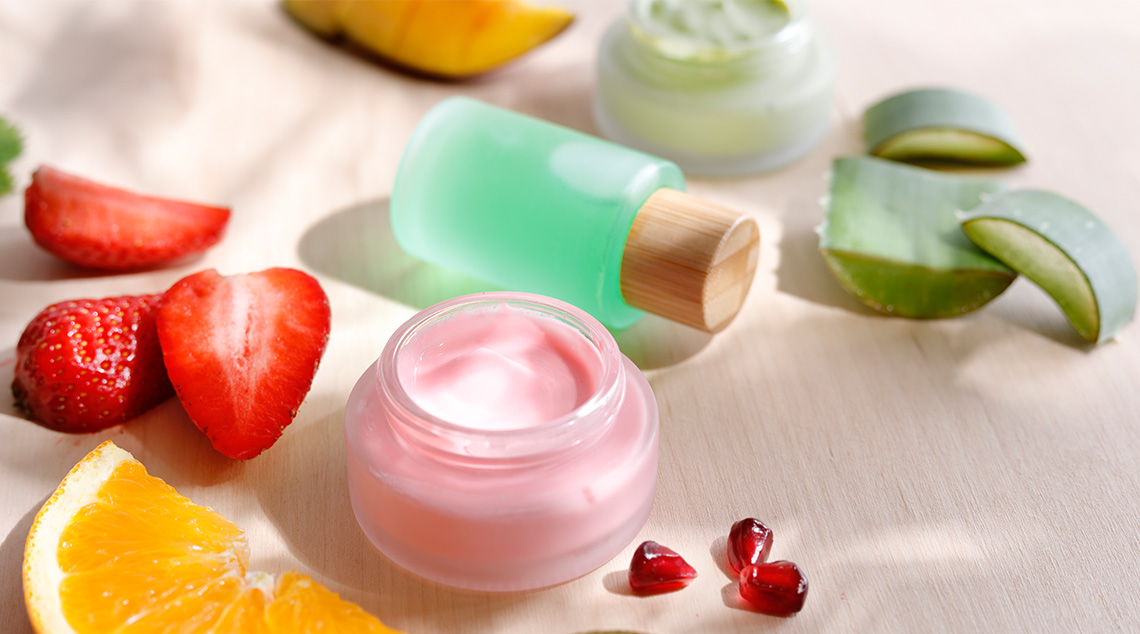How vegan products are changing the face of skincare
Vegan skincare products are known for being kinder to animals and the planet – but they’re also good news for your skin. Our experts explain.
Vegan skincare products are a fast-growing category within the Australian beauty landscape.
According to a market research report, the organic/vegan skincare market is forecast to reach $23.4 million by 2024, an increase of 6.3 per cent in just four years.
Here the experts weigh in on vegan beauty products and what they can do for the skin.
What is vegan skincare?
Cosmetic chemist Terri (Vinson) Jones says the defining attribute of vegan skincare is that it’s “formulated without any animal-derived ingredients or by-products”.
Some (but not all) vegan products have an additional Cruelty Free International (CFI) Leaping Bunny certification, which indicates that the product and individual ingredients within that product have not been tested on animals.
What does vegan skincare contain?
Common animal-derived ingredients like beeswax, lanolin, collagen and squalene are out when it comes to vegan skincare. So, what’s in?
“Vegan skincare utilises natural alternatives like plant-based ingredients and minerals, as well as synthetic ingredients, to create effective formulations,” The Longevity Remedy naturopath and founder Michaela Sparrow says.
Some of the more common vegan skincare ingredients include vegan squalane, jojoba oil, argan oil, coconut oil, aloe vera, chamomile, green tea extract, and hyaluronic acid.
Terri, author of SkInformation, say these natural ingredients are often better tolerated by a wide variety of skin types, including sensitive skin.
“For example, aloe vera, chamomile and green tea extract are both hydrating and gentle.”
Is vegan skincare effective?
“Quality vegan skincare can improve texture, reduce the appearance of fine lines, and promote overall skin health,” Michaela says.
Terri explains that this is because certain naturally derived vegan ingredients are highly active.
“For example, exfoliants like fruit enzymes, alpha hydroxy acids (AHAs) and beta hydroxy acids (BHAs) can improve uneven skin tone or acne-prone skin,” Terri says.
“Laboratory created peptides are also vegan and can target fine lines, redness, acne and pigmentation.”
However, she cautions that “not all vegan skincare products are created equal” and recommends shoppers be wary when it comes to backyard formulators or products from market stalls.
“These products may not be manufactured to laboratory standards and can be compromised for quality and safety,” Terri says.
Why should I ‘go vegan’ with my beauty routine?
Adopting a vegan skincare routine is very much a personal choice, according to Virginia Woodger, of natural and vegan brand Sukin.
“A vegan skincare routine aligns with ethical, environmental and sustainability values, while also providing skin benefits such as hydration, refined skin texture and a healthy-looking complexion,” Virginia says.
“It’s good for you – and the planet.”
Michaela adds that you don’t have to follow a vegan diet to embrace vegan skincare.
“Vegan skincare is an ethical choice for many people,” she says.
“But the products are also gentler and therefore complementary to a variety of skin types.”
It’s also “absolutely fine” to incorporate vegan skincare alongside non-vegan products.
“It’s about discovering what works best for your skin, while making conscious choices,” she says.
What are some popular vegan skincare brands?
There are plenty of top pharmacy-stocked vegan skincare products available in Australia, including brands like Trilogy, Antipodes and Sukin.
More on vegan living:
- Going vegan: What you need to know to make the switch
- Common nutritional deficiencies vegans and vegetarians need to know
- Are vegans healthier than meat-eaters?
Written by Sharon Hunt.




